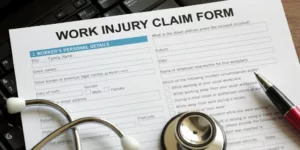Workers’ compensation benefits are in place to protect both the employer and employee. These benefits will cover an employee’s injuries on-the-job, but oftentimes, mistakes are made by both parties when an accident occurs.
It’s important to do your best to avoid common mistakes and embrace standard protocols.
A few of the dos and don’ts to follow are:
Do Identify Witnesses Immediately
Anyone that is a witness to the accident is a witness for your worker’s compensation case. It’s these individuals that will help strengthen your claim.
Why is this important?
Insurance companies are aggressive, and the last thing any insurance company wants to do is honor a claim. Rejections can and do happen every day, and a witness to your claim will lower the risk of a rejection.
You need witnesses to help corroborate your claim.
Ask witnesses for their:
- Names
- Addresses
- Phone numbers
If you’re severely injured, remain still and either keep a mental note of witnesses or ask someone else to gather witness information.
And if you do receive a denied claim, you can appeal it. In fact, 47% of people that receive a settlement had a denied claim.
Don’t Force Injured Workers to Go Back to Work
Employees that are injured should not be forced to go back to work. It’s a big mistake to force any employee back into the workforce if they suffered an injury. Doctors and employers make this mistake, and it can lead to:
- Additional injuries
- Reinjury
- Risks for other employers
“Almost 80 percent of companies have return to work programs in place to lower their workers’ compensation costs. These programs put injured employees back to work with some type restrictions,” explains DePaolo & Zadeikis.
Good for employers and often bad for employees, these programs can do more harm than good.
Employers need to work alongside doctors to determine if it’s a smart idea to send an employee back to work even on a work program. If it’s determined that reentry can cause further injuries or put other workers at-risk, it may be wise to keep the employee out of the workforce for the time-being.
Do Mention Every Point of Injury
You never want to be vague when explaining your injury. You need to be very thorough, explaining every point of contact when an injury occurred and what aches, hurts or just doesn’t feel right.
Treatment will only be limited to the areas of the body which were initially hurt.
Maybe you hit your head and it didn’t seem like a big deal at the time. But then you start having severe headaches or vision problems the next week. You may not be able to be treated if all you told the doctor was that you hurt your back.
Every detail counts, and while it’s important to mention the areas that hurt the most after an accident, you also need to explain the other areas of the body that were impacted.
A small bump today might turn into a very painful injury tomorrow.
Don’t downplay your injuries – they should be tended to properly. Otherwise, you may leave out details that could have helped you with your claim, settlement and treatment options. Remember, insurance companies are protecting their bottom line, and it’s not in their best interest to pay out a settlement or treat you.
Report everything in your claim. Otherwise, what you don’t report might not be able to be treated properly in the future.
Don’t Discourage Immediate Reporting
Employees have a right to feel safe and secure in the workplace. If an employee fears reporting the incident, this is bad news for the employer. Not only can an employer get in trouble for avoiding workers’ comp laws, but the employee may become injured further if reporting is discouraged.
A lot of employers don’t want incidents reported because they’ll go against “safety records.”
Instead, all businesses should be doing their best to reduce workplace injuries and encourage accurate reporting of injuries.
Employees need to report the incident immediately and not be talked out of making a report. If someone asks for a recorded statement that is not involved, do not give it to them. Employers do not want workers’ comp claims to be filed and may try to persuade you to not file a report.








